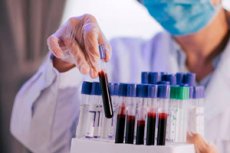New publications
Alzheimer's biomarkers in the brain can be detected as early as middle age
Last reviewed: 15.07.2025

All iLive content is medically reviewed or fact checked to ensure as much factual accuracy as possible.
We have strict sourcing guidelines and only link to reputable media sites, academic research institutions and, whenever possible, medically peer reviewed studies. Note that the numbers in parentheses ([1], [2], etc.) are clickable links to these studies.
If you feel that any of our content is inaccurate, out-of-date, or otherwise questionable, please select it and press Ctrl + Enter.

A Finnish population study has shown that signs associated with Alzheimer's disease can already be detected in the brain in middle age. In the future, biomarkers in the blood associated with Alzheimer's disease may allow the disease to be detected at an earlier stage. This would make it possible to target preventive treatment to the right people while the disease is still in its mild stages.
As the population ages, Alzheimer's disease and other dementias are becoming more common. The pathological processes that lead to symptoms begin years or even decades before cognitive decline, such as memory, becomes noticeable.
A study conducted at the University of Turku, Finland, has found that even middle-aged people may have elevated levels of blood biomarkers associated with Alzheimer's disease, and these levels increase with age.
A new finding was that high biomarker levels in parents, especially the mother, may be associated with higher biomarker levels in their children in middle age. In addition, the researchers found that kidney disease may be associated with elevated biomarker levels already in middle age.
The APOE ε4 gene, which increases the risk of Alzheimer's disease, was associated with higher blood biomarker levels in old age, but not yet in middle age.
The study is part of the national project "Cardiovascular risk in young Finns", coordinated by the Research Centre for Applied and Preventive Cardiovascular Medicine, University of Turku. The results of the study were published in the journal The Lancet Healthy Longevity.
Blood test could help diagnose Alzheimer's in the future
Recently, it has become possible to detect biomarkers associated with Alzheimer's disease using blood tests. In the future, this will offer a cost-effective method for identifying people at highest risk of developing Alzheimer's disease and giving them priority access to preventive treatment.
“In clinical practice, the detection of beta-amyloid pathology associated with Alzheimer’s disease currently requires imaging methods or cerebrospinal fluid sampling. However, recently developed ultra-sensitive measurement technologies now make it possible to detect Alzheimer’s disease biomarkers in blood samples,” says Suvi Rovio, a senior researcher at the University of Turku’s Centre for Applied and Preventive Cardiovascular Medicine, who led the study.
Currently, it is not possible to definitively diagnose Alzheimer's disease using blood tests, as this method is still limited by the lack of generally accepted reference values. In addition, it remains unclear which adverse factors influence the concentration of Alzheimer's disease-related biomarkers in the blood. Therefore, the interpretation of biomarkers obtained from blood tests may lead to misdiagnosis.
“In order to reliably use blood biomarkers for the diagnosis of Alzheimer's disease in the future, more studies are needed in different populations and age groups to standardize reference values,” Rovio emphasizes.
The study measured biomarkers associated with Alzheimer's disease in blood samples from middle-aged participants (41-56 years) and their parents (59-90 years). A total of 2,051 people took part in the study.
"Until now, brain biomarkers associated with Alzheimer's disease have mainly been studied in older people. Our study provides new insights into biomarker levels and associated factors starting from middle age," says Marja Heiskanen, Senior Researcher at the University of Turku's Research Centre for Applied and Preventive Cardiovascular Medicine.
